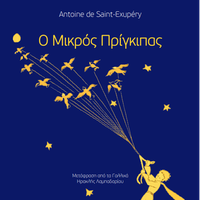20//
20//
20//
20//
20//
20//
20//
Έχοντας περπατήσει για αρκετό καιρό μέσα στην άμμο, στα βράχια και στα χιόνια, έφτασε η στιγμή που, επιτέλους, ανακάλυψε έναν δρόμο.
Ayant|marché|pendant|longtemps|temps|dans||sable|sur les|rochers|et|sur les|neiges|arriva|le|moment|où|enfin|découvrit|un|chemin
Having|walked|for|quite a|long time|through|in the|sand|on the|rocks|and|in the|snows|arrived|the|moment|when|finally|discovered|a|road
|gegangen||||||Sand||Felsen|||Schnee||||||||
Depois de ter caminhado durante muito tempo na areia, nas pedras e na neve, chegou o momento em que, finalmente, descobriu uma estrada.
Having walked for quite a while through the sand, the rocks, and the snow, the moment finally came when he discovered a road.
Après avoir marché pendant un certain temps dans le sable, sur les rochers et dans la neige, le moment est enfin arrivé où il a découvert un chemin.
Κι οι δρόμοι οδηγούν όλοι στους ανθρώπους.
Et|les|routes|mènent|tous|vers les|gens
And|the|roads|lead|all|to the|people
E todos os caminhos vão dar às pessoas.
And all roads lead to people.
Et tous les chemins mènent aux gens.
«Καλημέρα» είπε.
Bonjour|a dit
Good morning|he/she said
"Good morning," he said.
«Bonjour» a-t-il dit.
Ήταν ένας κήπος ολάνθιστος με τριαντάφυλλα.
Il était|un|jardin|en pleine floraison|avec|roses
It was|a|garden|fully blooming|with|roses
|||blühend||Rosen
Era um jardim florido de rosas.
It was a garden full of blooming roses.
C'était un jardin en pleine floraison avec des roses.
«Καλημέρα» είπαν τα τριαντάφυλλα.
Bonjour|ont dit|les|roses
Good morning|said|the|roses
"Good morning," said the roses.
«Bonjour» dirent les roses.
Ο μικρός πρίγκιπας τα κοίταξε.
Le|petit|prince|les|regarda
The|little|prince|them|looked
O pequeno príncipe olhou para eles.
The little prince looked at them.
Le petit prince les regarda.
Έμοιαζαν πολύ με το δικό του λουλούδι.
Ils ressemblaient|beaucoup|à|le|propre|à lui|fleur
They resembled|very|with|the|own|his|flower
Pareciam-se muito com a sua própria flor.
They looked very much like his own flower.
Elles ressemblaient beaucoup à sa propre fleur.
«Τι είσαστε;» τα ρώτησε έκπληκτος.
Qu'est-ce que|vous êtes|les|a demandé|surpris
What|are you|them|asked|surprised
"O que é que vocês são?", perguntou-lhes com surpresa.
"What are you?" he asked them in surprise.
«Que êtes-vous ?» demanda-t-il, surpris.
«Είμαστε τριαντάφυλλα» είπαν τα τριαντάφυλλα.
Nous sommes|roses|dirent|les|roses
We are|roses|said|the|roses
"We are roses," said the roses.
«Nous sommes des roses» dirent les roses.
«Α!» έκανε ο μικρός πρίγκιπας… Κι αισθάνθηκε πολύ δυστυχισμένος.
Ah|dit|le|petit|prince|Et|se sentit|très|malheureux
Ah|said|the|little|prince|And|felt|very|unhappy
||||||fühlte sich||unglücklich
"Ah!", disse o principezinho... E sentiu-se muito infeliz.
"Oh!" said the little prince... And he felt very unhappy.
«Ah !» fit le petit prince… Et il se sentit très malheureux.
Το λουλούδι του τού είχε πει ότι ήταν το μοναδικό του είδους του σ' ολόκληρο το σύμπαν.
Le|fleur|à lui|à lui|avait||que|était|le|unique|à lui|espèce|à lui|dans|tout|le|univers
The|flower|his|to him|had|told|that|was|the|only|of|kind|his|in|whole|the|universe
|||||||||||von seiner Art|||||Univers
A sua flor tinha-lhe dito que era a única do seu género em todo o universo.
His flower had told him that it was the only one of its kind in the entire universe.
Sa fleur lui avait dit qu'elle était la seule de son espèce dans tout l'univers.
Και να λοιπόν που υπήρχαν πέντε χιλιάδες, όλα ακριβώς ίδια μεταξύ τους, σ' έναν μόνο κήπο!
Et|(particule verbale)|donc|qui|il y avait|cinq|mille|tout|exactement|identiques|entre|eux|dans|un|seul|jardin
And|to|well|that|there were|five|thousand|all|exactly|identical|among|them|in|one|only|garden
E eram cinco mil, todos exatamente iguais, num único jardim!
And here there were five thousand, all exactly alike, in just one garden!
Et voilà qu'il y avait cinq mille, tous exactement identiques entre eux, dans un seul jardin !
«Θα θύμωνε πάρα πολύ» σκέφτηκε «αν το έβλεπε αυτό… Θα έβηχε υπερβολικά και θα έκανε πως πεθαίνει για να γλιτώσει το ρεζίλεμα.
(verbe auxiliaire futur)|se fâcherait|très|beaucoup|pensa|si|le|voyait|cela|(verbe auxiliaire futur)|tousserait|de manière excessive|et|(verbe auxiliaire futur)|ferait|comme|meurt|pour|(particule de but)|échapper à|le|ridicule
would|get angry|very|much|he thought|if|it|saw|this|would|coughed|excessively|and|would|acted|as if|dies|to|in order to|escape|the|embarrassment
|würde sich ärgern|||||||||hustete|||||||||||Schande
"Ele ficaria muito zangado", pensou ela, "se visse isso... Tossiria demasiado e fingiria morrer para se poupar à vergonha.
"She would be very angry," he thought, "if she saw this... She would cough excessively and pretend to die to avoid the embarrassment.
«Il se fâcherait beaucoup» pensa-t-il «s'il voyait ça... Il tousserait de manière excessive et ferait semblant de mourir pour échapper à l'humiliation.
Και σίγουρα θα ήμουν υποχρεωμένος να προσποιηθώ πως την περιποιούμαι, διαφορετικά, για να ταπεινώσει κι εμένα, θα αφηνόταν να πεθάνει στ' αλήθεια…» Έπειτα σκέφτηκε: «Θεωρούσα πως ήμουν πλούσιος μ' ένα λουλούδι μοναδικό και δεν κατέχω παρά ένα συνηθισμένο τριαντάφυλλο.
Et|sûrement|(verbe auxiliaire futur)|j'étais|obligé|(particule verbale)|feindre|que|(article défini féminin)|je prends soin de|sinon|pour|(particule verbale)|humilier|aussi|moi|(verbe auxiliaire futur)|se laisserait|(particule verbale)|mourir|(contraction de σε το)|vraiment|Ensuite|il pensa|Je pensais|que|j'étais|riche|(contraction de με)|une|fleur|unique|et|ne|possède|que|un|ordinaire|rose
And|surely|would|I was|obliged|to|pretend|that|her|take care of|otherwise|to|to|humiliate|also|me|would|let himself|to|die|in the|truth|Then|he thought|I thought|that|I was|rich|with|one|flower|unique|and|not|possess|but|one|ordinary|rose
||||verpflichtet||vortäuschen|||pflege||||erniedrigen||||afgelassen|||||||ich hielt||||||||||besitzen||||Rosen
E, certamente, eu teria sido obrigado a fingir que cuidava dela, caso contrário, para me humilhar também, ela teria sido deixada a morrer de verdade...", então ele pensou: "Eu pensava que era rico com uma flor única e não possuía nada além de uma rosa comum.
And I would certainly be obliged to pretend to take care of her, otherwise, to humiliate me as well, she would let herself die for real..." Then he thought: "I believed I was rich with a unique flower and I possess nothing but an ordinary rose.
Et je serais certainement obligé de faire semblant de m'en occuper, sinon, pour m'humilier aussi, il se laisserait vraiment mourir... » Puis il pensa : «Je croyais que j'étais riche avec une fleur unique et je ne possède qu'une rose ordinaire.
Αυτό και τα τρία ηφαίστειά μου που μου φτάνουν ως το γόνατο, και το ένα απ' αυτά, ίσως να είναι ανενεργό για πάντα, δεν με κάνουν έναν σπουδαίο πρίγκιπα…» Και ξαπλωμένος πάνω στο χορτάρι, έκλαψε.
Cela|et|les|trois|volcans|à moi|qui|à moi|atteignent|jusqu'à|le|genou|et|le|un|parmi|ceux-ci|peut-être|(particule verbale)|soit|inactif|pour|toujours|ne|me|font|un|grand|prince|Et|allongé|sur||herbe|pleura
This|and|the|three|volcanoes|my|that|to me|reach|up to|the|knee|and|the|one|of|these|perhaps|to be|be|inactive|for|always|not|me|make|a|great|prince|And|lying|on|in the|grass|cried
||||Vulkane|||||||||||||||||||||||wichtiger|Prinzen||liegend|||Gras|weinte
Isso e os meus três vulcões à altura do joelho, um dos quais pode ficar inativo para sempre, não fazem de mim um grande príncipe..." e, deitado na relva, chorou.
"This and my three volcanoes that reach up to my knees, and one of them, perhaps, will be inactive forever, do not make me a great prince..." And lying on the grass, he cried.
Cela et mes trois volcans qui me montent jusqu'au genou, et l'un d'eux, peut-être, sera inactif pour toujours, ne font pas de moi un grand prince... » Et allongé sur l'herbe, il pleura.
SENT_CWT:AFkKFwvL=4.58 PAR_TRANS:gpt-4o-mini=1.98 SENT_CWT:AFkKFwvL=6.48 PAR_TRANS:gpt-4o-mini=2.05
en:AFkKFwvL fr:AFkKFwvL
openai.2025-02-07
ai_request(all=20 err=0.00%) translation(all=16 err=0.00%) cwt(all=200 err=1.50%)

